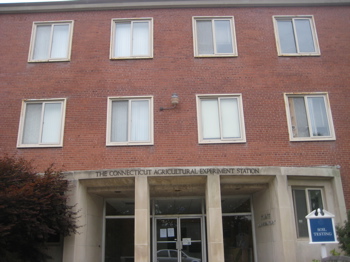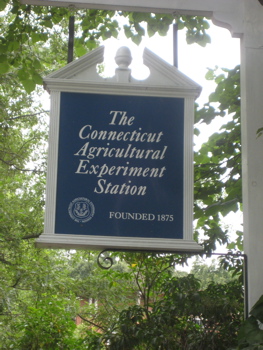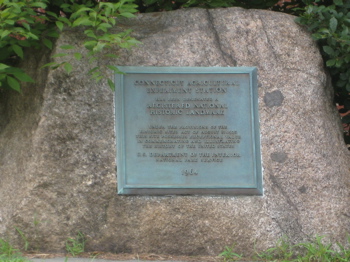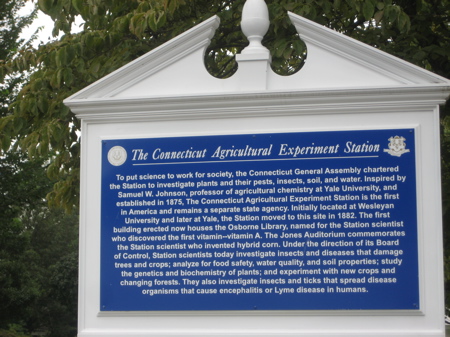CT National Historic Landmark
Connecticut Agricultural Experimental Station
123 Huntington St, New Haven
Yet another (sorta) Yale-New Haven associated National Historic Landmark that I could put on the “Historic science sites around town” tour. This one is a double whammy: Not only is it a National Historic Landmark, but it’s also a First in America! Woo-hoo, we celebrate this stuff ’round these parts. I’m gonna go drink some champagne now – to wash down my vitamins.

CTMQ’s First in the US page. (The same, but different.)
The Station’s farm in Hamden, treated as a museum.
More on why that’s relevant in a minute.
The Connecticut Agricultural Experiment Station is a state government component that engages in scientific research and public outreach in agriculture and related fields. It is the oldest state experiment station in the United States, having been founded in 1875. Its official mission is to “develop, advance, and disseminate scientific knowledge, improve agricultural productivity and environmental quality, protect plants, and enhance human health and well-being through research for the benefit of Connecticut residents and the nation.” The station operates a main research campus in New Haven, a research farm in Hamden, a satellite research facility and farm in Windsor, and a research farm in Griswold.

From what I gather, the New Haven station has an open house each spring and the Hamden farm has an annual open house day in early August. I work near the Windsor one and despite my poking around, it doesn’t seem as though it has any museum qualities.
The experimental station’s main facility in the Prospect Hill area of New Haven dates from 1882 when it became the permanent home of the first state agricultural experiment station. The station had been founded at Wesleyan University in 1875 and moved to Yale in 1877 as it became associated with the Sheffield Scientific School.
However, by 1882, the station needed more space, and Sheffield needed its space back. A 5 acre property at the top of Prospect Hill was purchased and the buildings built, using a $25,000 appropriation from the state legislature. The buildings include the Osborne Library, built in 1882-83 and believed to be the oldest building at any state agricultural experimental station and the Johnson Laboratory.

The station was declared a National Historic Landmark in 1964.
The station has been involved in important research over the years. Thomas Burr Osborne at the station and Lafayette Mendel at Yale collaborated on groundbreaking experiments on vitamin theory. Osborne discovered the first vitamin: A. (See how that works?) Mendel went on to become “The father of nutrition” and his house in New Haven is also a NHL. (CTMQ Visit here.) The Jones Auditorium commemorates The Station scientist who invented hybrid corn. Donald F. Jones developed the first practical high yield hybrid corn by the double-cross method.
What about today?
Under the direction of its Board of Control, Station scientists today investigated insects and diseases that damage trees and crops; analyze for food safety, water quality, and soil properties; study the genetics and biochemistry of plants; and experiment with new crops and changing forests. They also investigate insects and ticks that spread disease organisms that cause encephalitis of Lyme disease in humans. Perhaps most importantly, services at CAES are free, and any consumer wanting to know the composition of his soil, fertilizer, cattle food, seeds, or whether an insect or plant carries a disease has only to fill out a form and agree that all results will be made available for public use.
Free! in 2011! Amazing!

![]()
CTMQ visits CT’s National Historic Landmarks
CTMQ’s CT National Designations

 Debbie Sopchak says
Debbie Sopchak says
August 2, 2019 at 11:55 amOpen house in Hamden is August 7th 2019 10-4 (the first Wed of August every year).
You can learn about the trials they are running for Chestnut Trees, the Emerald Ash Borer, Grapevine Viruses, tick studies and more. They also have good examples of native shrubs and plants. Our favorite a few years ago was talking to the USDA agent who does ” Animal and Plant Health Inspection Service” and hearing about all the things people have tried to smuggle into the country. We also enjoyed the bee demo, though they are not running that this year.
 Diane for Eleanor Sierdy says
Diane for Eleanor Sierdy says
April 2, 2021 at 11:05 amHello, do you do water testing? I want to test my well for the quality of the drinking water. If you do not, can you recommend an organization and which tests I should request? Thank you! Our property is a home in the Huntington area of Shelton.
 David says
David says
July 14, 2025 at 1:24 pmIf I bring in scat can you tell me if it bear